National flag and state flag
| Flag | Date | Use | Description |
|---|---|---|---|
 | 1906–present | Civil and state flag and ensign | Dimensions: 5:2:9 horizontally and 4:2:4 vertically. |
Royal standards
| Flag | Date | Use | Description |
|---|---|---|---|
 | 1943–Present | Personal Command Sign of H.M. the King of Sweden (used on land). | The greater Coat of arms of Sweden, which is blue divided quarterly by a cross pattée of gold |
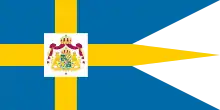 | 1905–present | Royal standard of Sweden, used by H.M. The King of Sweden and H.M. The Queen of Sweden | Royal flag with the greater national coat of arms |
| 1905–present | Royal pennant of Sweden, used by H.M. The King of Sweden above the royal flag on naval ships | Split pennant with the greater national coat of arms | |
 | 1905–present | Used by other members of the Royal House | Royal flag with the lesser national coat of arms (surrounded by the insignias of the Order of the Seraphim) |
| 1905–present | Used by the heir apparent above the royal flag on naval ships | Split pennant with the lesser national coat of arms | |
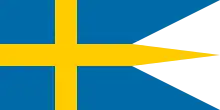 | 1905–present | Used by the Regent ad interim, when he is a non-royal | Same as the Military ensign |
.svg.png.webp) | 1844–1905 | Royal Standard of the King | |
.svg.png.webp) | 1815–1844 | Royal Standard with the Swedish Royal Arms | Naval ensign of the Union with square canton |
Military flags
| Flag | Date | Use | Description |
|---|---|---|---|
 | 1905–present | Military War flag and ensign of Sweden. Also used as a naval jack. |
Flags of the Navy
| Flag | Date | Use | Description |
|---|---|---|---|
 | 1972–present | Rank Flag of Admirals. | The naval ensign with four white stars in the upper hoist corner. Before 1972 the flag bore three stars (like the present flag of a Vice Admiral) |
 | 1972–present | Rank Flag of Vice Admirals. | The naval ensign with three white stars in the upper hoist corner. Before 1972 the flag bore two stars (like the present flag of a Rear Admiral) |
 | 1972–present | Rank Flag of Rear Admirals. | The naval ensign with two white stars in the upper hoist corner. Before 1972 the flag bore one star (like the present flag of a Flotilla Admiral) |
 | 2001–present | Rank Flag of Flotilla Admirals. | The naval ensign with one white star in the upper hoist corner. |
 | Broad pennant of Commodores. | Horizontally divided (1:1) forked broad pennant (5:8). | |
| Pennant of Commanders and Lieutenant Commanders. | |||
 | Burgee of Captains, Lieutenants and Ensigns. | Vertically divided (1:1) triangular ensign (5:8). | |
| Pennant of the Fleet Commander. | |||
| Pennant of the Flotilla Commander. | |||
| Pennant of the Division Commander. | |||
| Pennant of the Senior Commander Afloat. | |||
Historical flags
| Flag | Date | Use | Description |
|---|---|---|---|
.svg.png.webp) | November 1905–June 1906 | National flag and civil ensign | Union badge removed |
.svg.png.webp) | 1844–1905 | National flag and civil ensign | Union badge in the upper hoist corner |
.svg.png.webp) | 1844–1905 | State flag and military ensign | Union badge in the upper hoist corner |
_(alternative).svg.png.webp) | 1897–1905 | Alternate State flag | State flag to be used on state ships and at government buildings that did not fly the military ensign. Prior to 1897, used by private ships serving the Swedish Royal mail. |
.svg.png.webp) | 1844–1905 | Naval jack and diplomatic flag | The Union badge: a cross bearing the colours of both Sweden and Norway. |
 | –1844 | Civil ensign | Similar to the present national flag (slightly different colors and proportions occurred) |
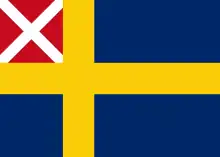 | 1818–1844 | Union civil ensign ("distant waters") | White saltire on red in the upper hoist corner. The canton in red and white represented Norway. The ensign was introduced on 26 October 1818, for use in "distant waters", i.e. beyond Cape Finisterre in North-West Spain, as an alternative to the standard Swedish civil ensign which could also be used by Norwegian ships if they wished. By Royal resolution of 17 July 1821, the saltire flag was ordered as the only Norwegian and Swedish civil ensign in "distant waters". |
.svg.png.webp) | 1815–1844 | State flag and military ensign | White saltire on red in the upper hoist corner. The canton in red and white represented Norway. |
_(alternative).svg.png.webp) | 1838–1844 | Alternate state flag | Used by private ships serving the Swedish Royal mail. |
 | 1761–1813 | Military ensign of the Archipelago fleet | An all blue triple-tailed flag to be used by the Arméns flotta. |
 | mid-17th century–1815 | State flag and war ensign | Similar to the present military ensign (slightly different colors and proportions occurred) |
 | c. 1520s – c. 1620 | State flag and war ensign | Swallow-tailed flag (slightly different colors and proportions occurred) |
Regional flags
| Flag | Status | Use | Description |
|---|---|---|---|
 | Official[1] | The traditional province of Skåne (Scania) | |
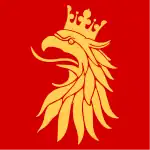 | Official | Skåne County (Scania) | Also a similar flag exists with blue background for Scania region |
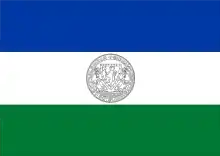 | Unofficial | The county of Jämtland | Jamtland (that belonged to Norway until 1645) has its own movement for the Republic of Jamtland – not a serious attempt for independence but more a touch of humor and local culture. The flag however is used in the area. |
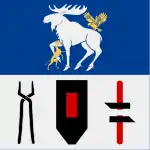 | Official | Jämtland County | Compare unofficial above. Jämtland modern county includes the two traditional provinces Jämtland and Härjedalen. |
 | Unofficial | The traditional province of Småland | Småland is a relatively large traditional province in the south of Sweden that today is divided in 3 administrative counties and also with 2 smaller areas outside these 3 counties. |
 | Official | Kronoberg County | Part of historical province of Småland (see above) |
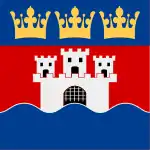 | Official | Jönköping County | Part of historical province of Småland (see above) |
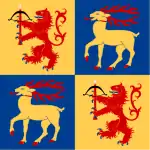 | Official | Kalmar County | Part of historical province of Småland (see above) and the island province Öland (see below). |
 | Unofficial | The historical province and island Öland outside Småland in the Baltic Sea | Öland (Swedish means "The Island Land") has a long history and different nature compared to the main land of Sweden. Öland is the second largest island in Sweden. |
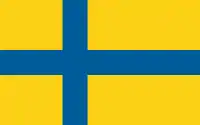 | Unofficial | The traditional province Östergötland | The blue cross relates to the two main channels and the yellow to agricultural flat areas. Not much in use. |
 | Official | Östergötland County | Compare unofficial above. |
 | Official | Västra Götaland County | Flag includes arms/flags from the 4 traditional provinces (Västergötland, Bohuslän, Dalsland and Älvsborg) that are included in this relatively newly formed regional county. |
 | Unofficial | The traditional province Västergötland | Not much in use. Also compare the previous flag above that covers the same area and more. |
 | Official | Blekinge County | The coat of arms for the traditional province of Blekinge and the administrative Blekinge county. Not much in use. |
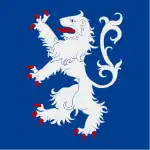 | Official | Halland County | There is a geographical difference between the administrative Halland county and the traditional Halland province. |
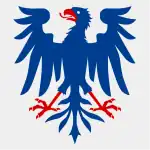 | Official | Värmland County | There is a geographical difference between the administrative Värmland county and the traditional Värmland province. |
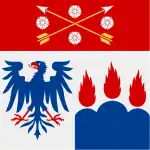 | Official | Örebro County | The Örebro county includes the traditional province Närke and parts of traditional provinces of Värmland and Västmanland. The flag includes arms from these 3 counties. |
 | Official | Södermanland County | The administrative Södermanland County includes parts (southern part) of traditional Södermanland County |
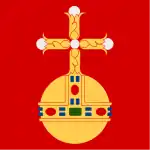 | Official | Uppsala County | The administrative Uppsala County includes parts (northern part) of traditional Uppland Province |
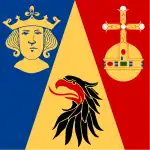 | Official | Stockholm County | The administrative Stockholm County includes parts (southern part) of traditional Uppland County and (northern part) of traditional Södermanland province. the flag includes arms from these both counties and also the arms of Stockholm city. |
 | Official | Gotland County | The administrative Gotland County consists of one main and a number of smaller islands in the Baltic sea. This is the only county in Sweden that only has one municipality. |
 | Official | Västmanland County | The administrative Västmanland County includes parts of traditional Västmanland province |
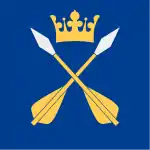 | Official | Dalarna County | This county was earlier known as Kopparbergs county and even earlier as Dalarna Province |
 | Official | Gävleborg County | Gävleborg administrative County encompasses the traditional provinces of Gästrikland and Hälsingland. |
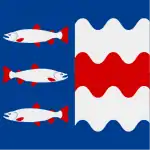 | Official | Västernorrland County | Västernorrland administrative county covers approximately the traditional province of Ångermanland and the traditional province of Medelpad. |
 | Official | Västerbotten County | Västerbotten administrative county covers the traditional province of Västerbotten and parts of the traditional province Swedish Lapland and traditional province of Ångermanland. |
 | Official | Norrbotten County | Norrbotten County includes the traditional province of Norrbotten and about two-thirds of the traditional province of Swedish Lapland. |
 | Unofficial[2] | Coastal area of Roslagen | Roslagen is the name of the coastal areas of Uppland province in Sweden, which also constitutes the northern part of the Stockholm archipelago. Norrtälje is sometimes named the capital city of Roslagen. |
Each official flag is based on the coat of arms for the county, see gallery, and used on buildings etc. used by respective county administration. Unofficial flags are used by private and local people.
See also
Wikimedia Commons has media related to Flags of Sweden.
References
- ↑ "Nu får skånska flaggan användas officiellt" (in Swedish). Sveriges Television. 28 November 2017.
- ↑ Nu får Roslagen en egen flagga (Swedish), 2020-07-08.
This article is issued from Wikipedia. The text is licensed under Creative Commons - Attribution - Sharealike. Additional terms may apply for the media files.